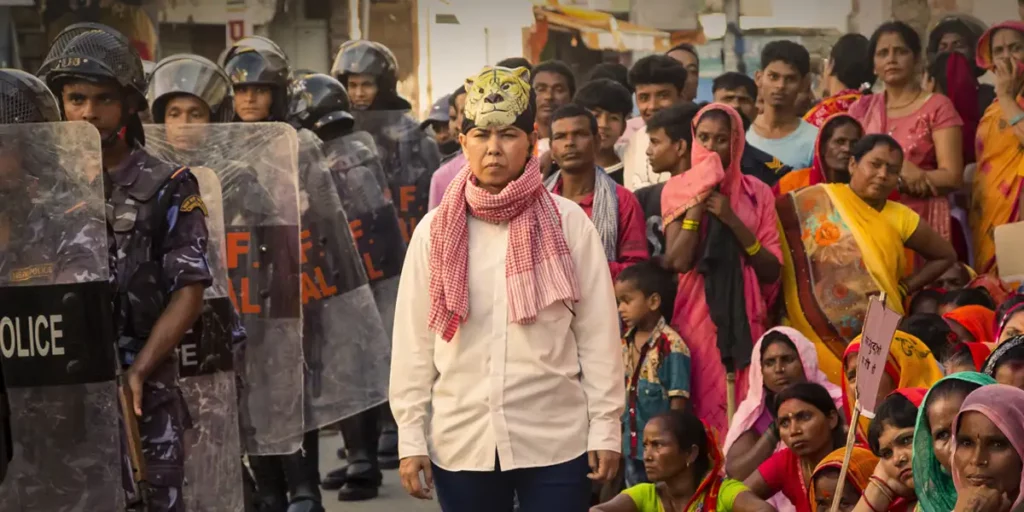Deepark Rauniya’s Pooja, Sir is really effective as a thrilling police procedural, but falters a little with its intimate character moments.
Director: Deepak Rauniyar
Genre: Crime, Thriller
Run Time: 118′
Venice Premiere: August 29, 2024
Release Date: March 21, 2025
In the midst of race discrimination protests and on the back of a decade-long civil war, Deepak Rauniyar’s Pooja, Sir showcases a turbulent Nepal. Based on true events that took place in 2015, the film is simultaneously a political and kidnapping thriller, with a little bit of character drama thrown in for good measure.
While it really impresses with the former, it’s with the latter that it stumbles a little, introducing a great main character whose individual nuances get lost somewhat in the intensity of the film’s action.
After the kidnapping of two young boys – one the son of a very influential couple – in a town close to the Nepalese/Indian border, Detective Inspector Pooja (Asha Magrati) arrives from Kathmandu to help solve the case. But the town is buckling under a series of violent protests from the marginalised Madhesi population, and it hinders the investigation efforts. Pooja, alongside a team that includes Madhesi officer Mamata (Nikita Chandrak), must wade through political unrest, corruption, discrimination and misogyny to bring justice to those who need it and save the lives of the two youngsters.
There are three distinct narrative threads in Pooja, Sir: the tumultuous Nepalese political and social climate, the cat-and-mouse race-against-time kidnapping plot, and Pooja’s personal life. And for the first two thirds of the film, there’s a relatively equal amount of time spent on each of them. Rauniyar really effectively explores the environment Pooja and the team are conducting their investigation in, building tension and stakes even higher than that of missing children. And the film really leans in to the complexities of police work, particularly the frustration and time sensitivity that comes with a kidnapping case.
But it’s in its exploration of Pooja herself that the film feels a little bit lacking. She’s clearly an exceptional police officer, brusque and empathetic in equal measure when the situation calls for it, and she makes some key discoveries about the kidnapper’s identity almost immediately. But there’s also a lot about her identity that remains frustratingly vague. Especially in her relationship to being a woman, a police officer and the merging of the two.

She’s introduced binding her chest, is in a happy and committed relationship with a female partner, Rama (Gaumaya Gurung), and insistent that she be referred to as ‘sir’. During a confrontation, Mamata even explicitly asks about why she presents herself ‘like a man’, but Pooja remains frustratingly tight-lipped.
It’s a film with so much going on around its protagonist – all of which is, admittedly, really engaging – that it almost forgets to spend any time with just her in a context that isn’t work related or adjacent. Magrati gives a really focused performance, aware of the role she’s playing as the outsider through which the audience is introduced to the case, the climate and the culture of 2015’s Nepal. But with Pooja being the lens through which everything else is explored, a bit more time to dive into the woman behind the job feels like it would have been really beneficial, and not necessarily at the expense of the film’s action.
Because Pooja, Sir does such a great job of creating and sustaining tension, particularly in a scene involving undercover work at a protest. Sheldon Chau’s camera gets almost buried in the crowds, and the threat of the protest becoming a powder keg feels like proper heart-in-the-throat type stuff. And that’s clearly something Ramiya wants to showcase, with the nuances of the political landscape during this time being very important to the writer/director, who has spoken specifically about how his own experiences of discrimination heavily influenced the film. Pooja, Sir is an important, personal and really compelling story, that just doesn’t nail the intimate character beats as well as it does pretty much everything else.
There are three compelling narratives within Pooja, Sir that may well have made three compelling films, but convalesce into one that is jam-packed, compelling and emotionally resonant. While it doesn’t delve as deeply into its main character as one might have hoped, it certainly paints an effective portrait of a strong woman undertaking an arduous task in a tumultuous landscape. And that’s certainly not unfamiliar to women all around the world.
Pooja, Sir had its World Premiere at the Venice Film Festival on August 29, 2024 and will be released in US theaters on March 21, 2025. Read our reviews of Maldoror and Quiet Life!

